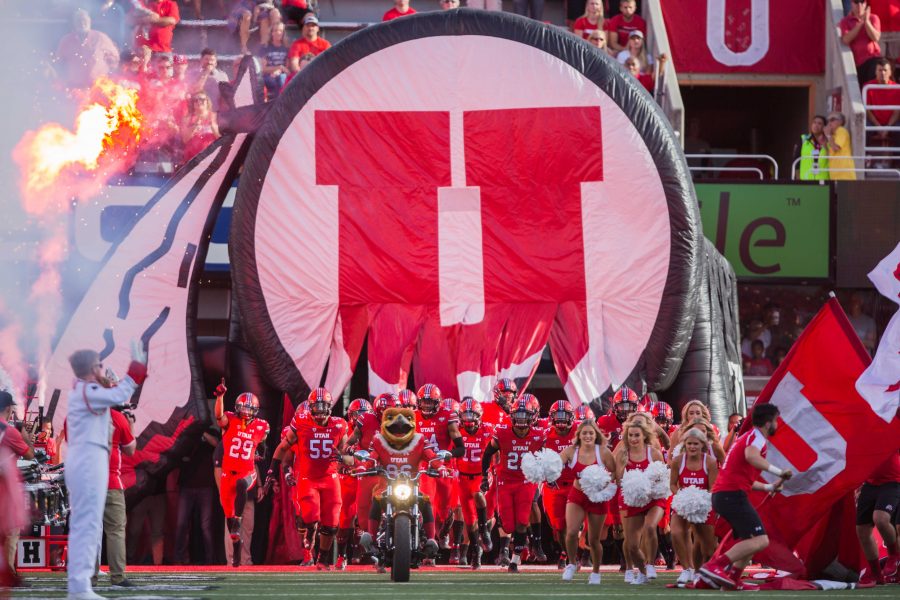The University of Utah’s use of the Ute name has been a hotly debated topic on campus in recent years. Now, members of the student body at another Pac-12 school are joining the ranks of those who object to the moniker.
The Student Entertainment Board (SEB) at Washington State University (WSU) tweeted a statement on Sept. 21 encouraging students to “stay culturally sensitive and aware, especially during residence decorating and the social media meme war.”
The statement prohibited students participating in homecoming events from referring to the U as anything other than “Utah” or “the University of Utah,” and said the board will penalize anyone using the word “Utes.” It also banned all use of University of Utah Athletics’ drum and feathers logo.
“The SEB does not support cultural appropriation of any kind and would like to steer clear of the way Utah’s mascot represents Native Americans,” the statement read.
Although the U’s athletic teams are referred to as the “Utes,” a red-tailed hawk named Swoop has been the school’s mascot since 1996. However, since then, the U has continued to struggle to foster respect toward Native Americans among students and fans.
In 2013, a student group called the Indigenous Students and Allies for Change petitioned the university to abandon the Ute name, using photos of fans wearing stereotypical Native American attire at school events — a practice the group said “is unilaterally allowing the denigration and mockery of Native American traditions, customs and religious symbols.”
The university’s use of the name has come under fire from more than students, though. On Aug. 4, 2005, the NCAA announced it would ban Native American images and nicknames from being used by teams starting in February of the next year. The U was on a list of 18 schools subject to the organization’s restrictions. The school was removed from the list after it submitted a seven-page appeal, which included a letter from then-chairwoman of the Uintah and Ouray Tribal Business Committee Maxine Natchees endorsing its use of the name.
Later that year, Natchees and then-U President J. Bernard Machen signed a Memorandum of Understanding (MoU) between the Ute Indian Tribe on the Uintah and Ouray Reservation and the school. It outlined a plan for the university to increase educational opportunities for students from the tribe. The MoU is renewed every five years.
“The university is committed to a strong partnership with The Ute Indian Tribe,” said U spokesperson Christopher Nelson in an email. “If the tribe were to decide to end the relationship and ask that the Ute name not be used for the university’s sports programs, the university would respect that request and cease using the Ute name. That said, there is no indication that the relationship will change in the near future and the university is optimistic that an extension of the agreement will move forward at the end of its current term.”
As WSU’s SEB noted in its statement, some dispute the validity of the agreement. Two other federally-recognized Ute tribes, both of which have reservations in Colorado, are not included in the agreement — the Ute Mountain Ute Tribe and the Southern Ute Tribe.
The MoU was last signed in 2014 and is set to be renewed next year. The U’s American Indian Resource Center did not respond to requests for comment on the agreement or the WSU organization’s statement.
One stipulation of the current MoU is that the university would begin “widely disseminating Standards for Appropriate Fan Behavior to students, athletic fans, campus groups and the broader community.” These standards are not distributed among the student sections of opposing schools.
“It is not that our organization sought to discredit Utah’s right or agreement with the tribe to use this name, but that we felt our students have no place to be using this name in regard to Utah’s team as it could lead to strife and discomfort within the diverse community we have on campus,” said Sophie Diltz, the director of WSU’s SEB. “We would never want students on campus to feel uncomfortable or misrepresented through the events we host, especially homecoming which is supposed to be fun for all involved.”



Andy • Jul 28, 2020 at 3:39 pm
If the University of Utah really cared they would have done this without signing an agreement with native tribes on using the name.
Robert Yazzie • Aug 21, 2019 at 6:01 am
As a Ute tribe member, and broad member on Ute board at Utah and graduated from Law school at University of Utah, our Tribe has always supported the Ute name and logo. If it was not for Utah and it’s support for the tribe, I would still be working at my job at a gas station. “Go Utes!” is more than just distinctive shorthand for Utah–it reflects and takes real meaning from Ute culture and heritage. Learn what’s behind that phrase, and use the name with the respect and honor that the history engenders with the logo. I’m proud to be a Ute and have gone to Utah. Our Tribe will always supports Utah’s drum and feathers logo” GO UTES!!!!
Tony Small • Oct 8, 2018 at 5:16 pm
Why not ask the people the Name originated from the Ute Indian Tribe not the Southern Ute not the Ute Mountain Ute but the “Ute Indian Tribe” of Utah we or very proud Ute People and our proud of the University of Utah. The University of Utah has shown the Ute Tribe the utmost respect with holding the Ute proud game and also Native American month.
Cora • Oct 8, 2018 at 9:19 am
Thank you. Very informational and well done.
Julie Dye • Oct 1, 2018 at 4:21 am
Thank you WSU for having the leadershop & bravery to tell U of T to leave their racism at home!